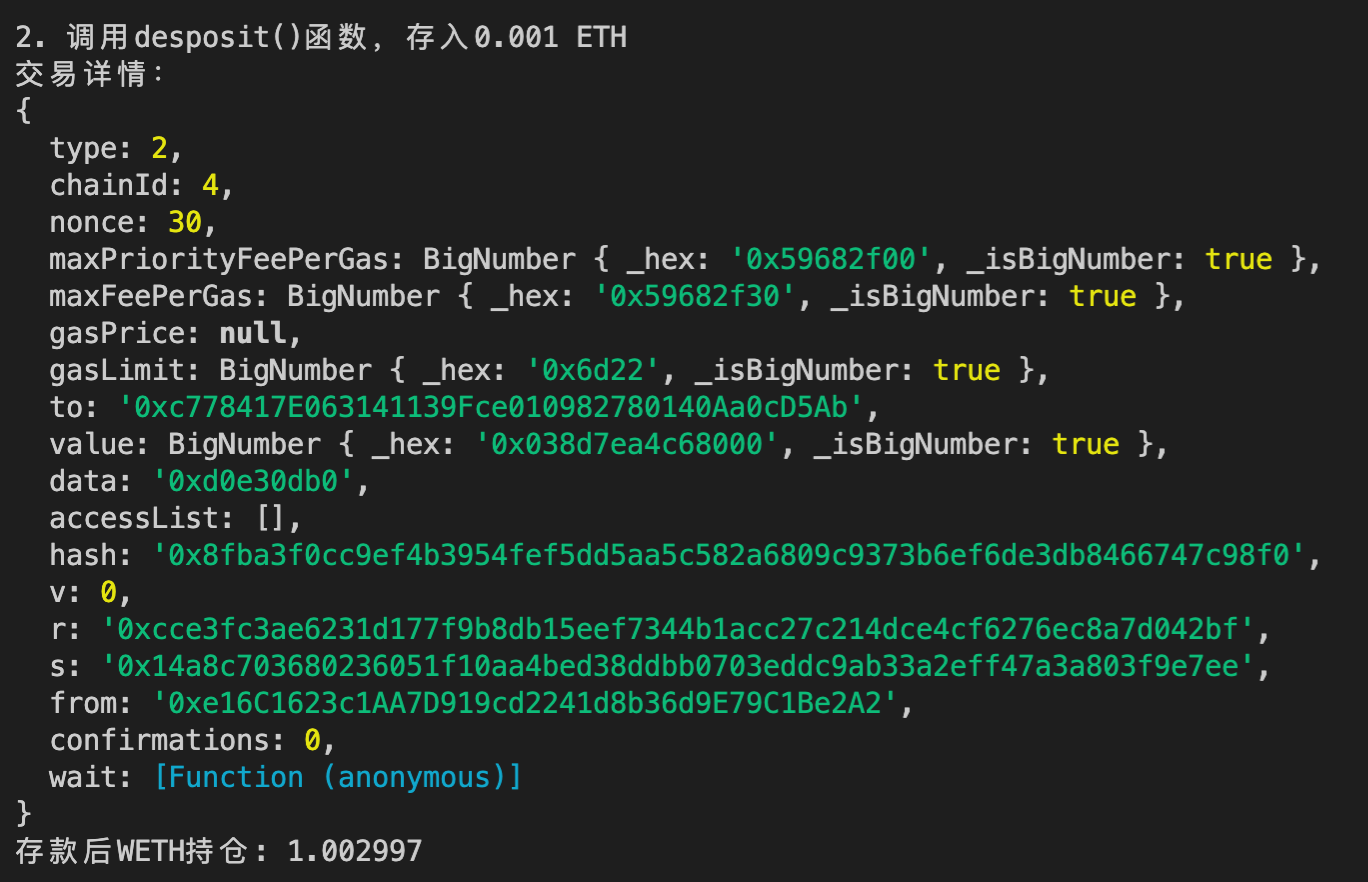WTF Ethers: 5. Contract Interaction
I've been revisiting ethers.js recently to refresh my understanding of the details and to write a simple tutorial called "WTF Ethers" for beginners.
Twitter: @0xAA_Science
Community: Website wtf.academy | WTF Solidity | discord | WeChat Group Application
All the code and tutorials are open-sourced on GitHub: github.com/WTFAcademy/WTF-Ethers
In this lesson, we will learn how to declare a writable Contract variable and interact with the WETH contract on the test network.
Creating a Writable Contract Variable
The rule for declaring a writable Contract variable is as follows:
const contract = new ethers.Contract(address, abi, signer)
Here, address is the contract address, abi is the contract's ABI interface, and signer is the wallet object. Note that you need to provide a signer here, whereas when declaring a readable contract, you only need to provide a provider.
You can also convert a readable contract into a writable contract using the following method:
const contract2 = contract.connect(signer)
Contract Interaction
In Lesson 3, we learned how to read contract information. It does not require any gas. Here, we will learn how to write to a contract, which involves building a transaction and paying for gas. This transaction will be validated by every node and miner on the network, and the blockchain state will be changed.
You can interact with a contract using the following methods:
// Send a transaction
const tx = await contract.METHOD_NAME(args [, overrides])
// Wait for the transaction to be confirmed on the chain
await tx.wait()
Here, METHOD_NAME is the name of the function to be called, args is the function's parameters, and [, overrides] is optional data that can be passed, including:
- gasPrice: Gas price
- gasLimit: Gas limit
- value: Ether sent during the call (in wei)
- nonce: Nonce
Note: This method cannot fetch the return value of the contract. If you need it, you have to use Solidity events to record the value and then query using the transaction receipt.
Example: Interacting with the Test Network's WETH Contract
WETH (Wrapped ETH) is a wrapped version of ETH. It wraps native Ethereum tokens using a smart contract to conform to the ERC20 standard. For more detailed content about the WETH contract, refer to the WTF Solidity Tutorial on WETH.
Create the
providerandwalletvariables.import { ethers } from "ethers";
// Connect to the Ethereum network using Alchemy's RPC node
const ALCHEMY_GOERLI_URL = 'https://eth-goerli.alchemyapi.io/v2/GlaeWuylnNM3uuOo-SAwJxuwTdqHaY5l';
const provider = new ethers.JsonRpcProvider(ALCHEMY_GOERLI_URL);
// Create a wallet object using the private key and provider
const privateKey = '0x227dbb8586117d55284e26620bc76534dfbd2394be34cf4a09cb775d593b6f2b'
const wallet = new ethers.Wallet(privateKey, provider)Create a writable
WETHcontract variable. We include four functions that we will call in the contract's ABI:balanceOf(address): Query theWETHbalance of an address.deposit(): Convert transferredETHtoWETHwithin the contract.transfer(address, uint256): TransferWETHto an address.withdraw(uint256): Withdraw funds from the contract.
// WETH ABI
const abiWETH = [
"function balanceOf(address) public view returns(uint)",
"function deposit() public payable",
"function transfer(address, uint) public returns (bool)",
"function withdraw(uint) public",
];
// WETH contract address (Goerli Test Network)
const addressWETH = '0xb4fbf271143f4fbf7b91a5ded31805e42b2208d6' // WETH Contract
// Declare the writable contract
const contractWETH = new ethers.Contract(addressWETH, abiWETH, wallet)
// Alternatively, you can declare a readable contract and then convert it to a writable contract using the `connect(wallet)` function.
// const contractWETH = new ethers.Contract(addressWETH, abiWETH, provider)
// contractWETH.connect(wallet)Read the account's
WETHbalance. You can see that the balance is1.001997.const address = await wallet.getAddress()
// Read on-chain information of the WETH contract (WETH ABI)
console.log("\n1. Read WETH balance")
const balanceWETH = await contractWETH.balanceOf(address)
console.log(`WETH balance before deposit: ${ethers.formatEther(balanceWETH)}\n`)
Call the
deposit()function of theWETHcontract to convert0.001 ETHinto0.001 WETH. Print the transaction details and the balance. You can see that the balance becomes1.002997.console.log("\n2. Call the deposit() function to deposit 0.001 ETH")
// Send the transaction
const tx = await contractWETH.deposit({value: ethers.parseEther("0.001")})
// Wait for the transaction to be confirmed
await tx.wait()
console.log(`Transaction details:`)
console.log(tx)
const balanceWETH_deposit = await contractWETH.balanceOf(address)
console.log(`WETH balance after deposit: ${ethers.formatEther(balanceWETH_deposit)}\n`)
Call the
transfer()function of theWETHcontract to transfer0.001 WETHto Vitalik. Print the balance. You can see that the balance becomes1.001997.```js
console.log("\n3. Call the transfer() function to transfer 0.001 WETH to Vitalik")
// Send the transaction
const tx2 = await contractWETH.transfer("vitalik.eth", ethers.parseEther("0.001"))
// Wait for the transaction to be confirmed
await tx2.wait()
const balanceWETH_transfer = await contractWETH.balanceOf(address)
console.log(`WETH balance after transfer: ${ethers.formatEther(balanceWETH_transfer)}\n`)
```
Note: Observe the deposit() function and the balanceOf() function, why do they return different values? Why does the former return a bunch of data while the latter only returns a specific value? This is because for a wallet balance, it is a read-only operation, it reads what it is. However, for a function call, it does not know when the data will be confirmed on the blockchain, so it only returns information about the transaction. In summary, for non-pure/view function calls, it will return the transaction information. If you want to know the changes in contract variables during the execution of a function, you can use emit to output events in the contract, and read the event information from the returned transaction to obtain the corresponding values.
Summary
In this lesson, we have learned how to declare writable Contract variables and interact with the WETH contract on the test network. We called the deposit() function of WETH to convert 0.001 ETH into WETH, and transferred it to Vitalik.